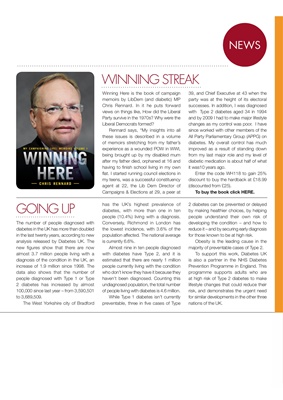
NEWS
Winning Here is the book of campaign
memoirs by LibDem (and diabetic) MP
Chris Rennard. In it he puts forward
views on things like, How did the Liberal
Party survive in the 1970s? Why were the
Liberal Democrats formed?
Rennard says, "My insights into all
these issues is described in a volume
of memoirs stretching from my father's
experience as a wounded POW in WWI,
being brought up by my disabled mum
after my father died, orphaned at 16 and
having to finish school living in my own
flat. I started running council elections in
my teens, was a successful constituency
agent at 22, the Lib Dem Director of
Campaigns & Elections at 29, a peer at
WINNING STREAK
39, and Chief Executive at 43 when the
party was at the height of its electoral
successes. In addition, I was diagnosed
with Type 2 diabetes aged 34 in 1994
and by 2009 I had to make major lifestyle
changes as my control was poor. I have
since worked with other members of the
All Party Parliamentary Group (APPG) on
diabetes. My overall control has much
improved as a result of standing down
from my last major role and my level of
diabetic medication is about half of what
it was10 years ago.
Enter the code WH118 to gain 25%
discount to buy the hardback at £18.99
(discounted from £25).
To buy the book click HERE.
The number of people diagnosed with
diabetes in the UK has more than doubled
in the last twenty years, according to new
analysis released by Diabetes UK. The
new figures show that there are now
almost 3.7 million people living with a
diagnosis of the condition in the UK, an
increase of 1.9 million since 1998. The
data also shows that the number of
people diagnosed with Type 1 or Type
2 diabetes has increased by almost
100,000 since last year - from 3,590,501
to 3,689,509.
The West Yorkshire city of Bradford
has the UK's highest prevalence of
diabetes, with more than one in ten
people (10.4%) living with a diagnosis.
Conversely, Richmond in London has
the lowest incidence, with 3.6% of the
population affected. The national average
is currently 6.6%.
Almost nine in ten people diagnosed
with diabetes have Type 2, and it is
estimated that there are nearly 1 million
people currently living with the condition
who don't know they have it because they
haven't been diagnosed. Counting this
undiagnosed population, the total number
of people living with diabetes is 4.6 million.
While Type 1 diabetes isn't currently
preventable, three in five cases of Type
2 diabetes can be prevented or delayed
by making healthier choices, by helping
people understand their own risk of
developing the condition − and how to
reduce it - and by securing early diagnosis
for those known to be at high risk.
Obesity is the leading cause in the
majority of preventable cases of Type 2.
To support this work, Diabetes UK
is also a partner in the NHS Diabetes
Prevention Programme in England. This
programme supports adults who are
at high risk of Type 2 diabetes to make
lifestyle changes that could reduce their
risk, and demonstrates the urgent need
for similar developments in the other three
nations of the UK.
GOING UP